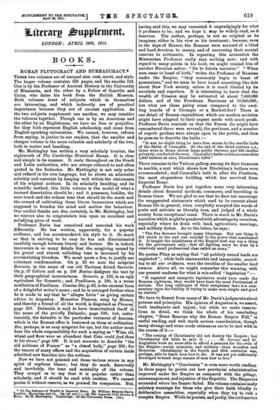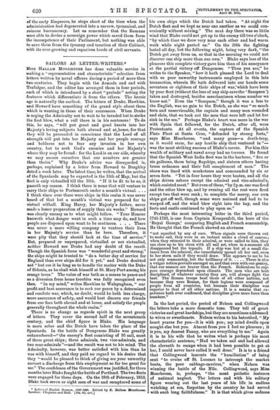BOOKS.
ROMAN PLUTOCRACY AND BUREAUCRACY.* THESE two volumes are of unequal size, cost, merit, and style. The larger volume contains 335 pages, and the smaller 152. One is by the Professor of Ancient History in the University of Minnesota, and the other by a Fellow of Gonville and Caius, who dates his book from the British Museum. Both volumes treat of subjects which in themselves are interesting, and which indirectly are of practical importance because they are of current application. As the two subjects supplement one another, we may consider the volumes together. Though one is by an American and the other by an Englishman, we have no bias or prejudice, for they both represent English scholarship and come from English-speaking universities. We cannot, however, refrain from saying, in justice to our readers, that the smaller and cheaper volume is the more valuable and scholarly of the two, both in matter and handling.
Mr. Mattingley has written, a very scholarly treatise, the eighteenth of The Cambridge Historical Essays. It is clear and simple in its manner. It rests throughout on the Greek and Latin authorities, who are always referred to and often quoted in the footnotes. Mr. Mattingley is not only sober and refined in his own language, but he shows an admirable sobriety and restraint by keeping well within the statements of his original authors. In its scholarly handling and its scientific method, this little volume is the model of what a learned dissertation should be ; and it possesses, besides, the sure touch and the urbane tone that should be the mark and the reward of cultivating those literae humaniores which are supposed to broaden the mind and mellow the behaviour. Our cordial thanks are due, certainly, to Mr. Mattingley, but we venture also to congratulate him upon an excellent and satisfying piece of work.
Professor Davis has conceived and executed his work differently. He has written, apparently, for a popular audience, and has accommodated his style to it. So much so that in striving to be easy he has not discriminated carefully enough between liberty and licence. He is, indeed, inaccurate in so many details that the misgiving caused by his genial and almost rollicking tone is increased by his accumulating blunders. We must quote a few, to justify our reluctant condemnation. On p. 23 we note the misprint Sacraria in the name of our old Tacitean friend Sacrovir. On p. 57 Celicia and on p. 108 Bosina disfigure the text by their geographical incorrectness. Geiseric, p. 122, is an ugly equivalent for Genseric ; and Panlliures, p. 180, is a worse mutilation of Paullinns. Cassius Die, p. 63, is the unusual form of a delightful writer's name ; and he is outraged further when he is made to say that he "alleges Livia" as giving certain advice to Augustus. Mtmatius Plancus, sung by Horace and thereby a friend of all the, world, is disguised as Plaucui page 253. Dalmatia is said to have immortalized itself in the name of the priestly Dalmatic, page 108; but, unfor- tunately, the dalmatic is the particular vestment of deacons, which in the Romer( office is bestowed on them at ordination. Eve, perhaps, is an easy misprint for eye, but the author must bear the whole responsibility for such a saying as " Wine, oil, wheat and flour were so abundant that Cato could feed them to his slaves," page 199. It is not accurate to describe "the old noblesse of France" as " a clesed body," page 220 ; for the tenure of many offices and the acquisition of certain lands admitted new families into the noblesse.
Now we have not pointed out these various errors in any spirit of captious blame ; but they do mark, deservedly and inevitably, the tone and mentality of the volume. They compel us to say that it is popular rather than scholarly, and it should be read with caution. We cannot praise it without reserve, as we praised its companion. But,
• (1) The Influence of Wealth in Imperial Boma. By William Stearn London Macmillan and.Co. [8e. 6d. net:1—(2) The Imperial Civil Service of By n.-Mattingtey. -'Cambridge, At ilnilIsiirerviY Press. [4..]
having said this, we may commend it ungrudgingly for what it professes to be ; and we hope K may be widely read, as it deserves. The author, perhaps, is not so original as he imagines, either in his view or his treatment ; because, even in the days of Horace, the Romans were accused of a blind
and hard devotion to money, and of narrowing their mental exercise to arithmetic. In repeating this accusation the Minnesotan Professor really says nothing new ; and with regard to many points in his book, we might remind him of another Horatian satire " De to fabula narratur." "When men cease to boast of birth," writes the Professor of Romans under the Empire, " they commonly begin to boast of
possessions," and we seem to have heard something like this about New York society, unless it is much libelled by its novelists and reporters. It is interesting to know that the wealth of Crassus may be estimated at about 7,000,000 dollars, and of the Freedman Narcissus at 16,000,000; but what are these paltry sums compared to the swel- ling hoards of a Carnegie or a Rockefeller P There is one detail of Roman expenditure which our modern societies might have adapted to their urgent needs with much profit. Professor Davis reminds us that the Forum (he might have remembered there were several), the porticoes, and a number of superb gardens were always open to the public, and then he goes on to describe the baths :—
" It was no slight thing to have free access to the marble halls of the Baths of Caracalla. At the end of the third century A.D., there were in Rome eleven large public thermas, and 920 smaller privately conducted thermae. Caracalla's baths could accommodate 1,600 bathers at once, Diocletian's 3,600."
There remains in the Vatican gallery, among its finer treasures in marble, a seat which shows how Diocletian's bathers were accommodated ; and Caracalla's bath is, after the Pantheon, the most stupendous building which has survived from Imperial Rome.
Professor Davis has put together some very interesting details about financial methods, commerce, and travelling in Roman times. We are glad to see that he does not encourage the exaggerated statements which used to be current about Roman life in general, when everyboty accepted the words of poets and satirists as literally true, and judged of a whole society from exceptional cases. There is much in Mr. Davis's narrative which mightbe ponderedwith advantage by ourselves, especially where he deals with land, agriculture, marriage, and military duties. As to the latter, he says : "The Pax Rotnana brought many blessings. But one thing it did which in the end was suicidal to the power that maintained it. It taught the inhabitants of the Empire that war was a thing for the government only ; that all fighting must be done by a relatively small professional class called an army."
He quotes Pliny as saying that "all publicly owned lands are neglected" ; while both innumerable and insuperable, accord- ing to all our evidence, were the troubles of the smaller land owners. Above all, we might remember this warning, with our present madness for what is mis-called "legislation " :—
" If repeated and energetic legislation could have made the Romans righteous, they would have been the most Puritanical of nations. The long catalogue of their sumptuary laws is a com- mentary upon the futility of trying to make men simple and good by statute."
We have to dissent from many of Mr. Davia's judgments about persons and principles. His opinion of Augustus is, we assert,
both inadequate and unjust; but while we make reserva- tions in detail, we think the whole of his concluding
chapter, " Some Reasons why the Roman Empire Fell," is useful reading, and well worth serious consideration, though many strange and some crude utterances are to be met with in the coarse of it :—
"The coming of Christianity did not destroy the Empire ; but
Christianity did little to save it St. Jerome and St. Augustine were no more able to afford a panacea for the evils of the Empire—social, economic, and military—than Aroadius and Honoriva. Christianity in the fourth and fifth centuries was, perhaps, able to teach men how to die. It was not yet sufficiently developed to teach large masses of men how to live."
Mr. Mattingley's " Conclusion " is even more worth reading. In three pages he points out how provincial administration improved under the Empire as compared with the pillage, mismanagement, and injustice of the Republic. The Emperors
succeeded where the Senate failed. His volume contains many salutary warnings for those who give their faith blindly to deliberative assemblies, especially when they try to rule a complex Empire. While he praises, and justly, the civil service
of the early Emperors, he stops short of the time when the administration had degenerated into a narrow, tyrannical, and ruinous bureaucracy. Let us remember that the Romans were able to devise a sovereign power which saved them from the incompetence of their Parliament, but nothing was able to save them from the tyranny and taxation of their Cabinet, with its ever-growing and rapacious horde of civil servants.



























































 Previous page
Previous page